Golden age of television
20 results back to index

pages: 294 words: 82,438
Simple Rules: How to Thrive in a Complex World by Donald Sull, Kathleen M. Eisenhardt
Affordable Care Act / Obamacare, Airbnb, Apollo 13, asset allocation, Atul Gawande, barriers to entry, Basel III, behavioural economics, Berlin Wall, carbon footprint, Checklist Manifesto, complexity theory, Craig Reynolds: boids flock, Credit Default Swap, Daniel Kahneman / Amos Tversky, democratizing finance, diversification, drone strike, en.wikipedia.org, European colonialism, Exxon Valdez, facts on the ground, Fall of the Berlin Wall, Glass-Steagall Act, Golden age of television, haute cuisine, invention of the printing press, Isaac Newton, Kickstarter, late fees, Lean Startup, Louis Pasteur, Lyft, machine translation, Moneyball by Michael Lewis explains big data, Nate Silver, Network effects, obamacare, Paul Graham, performance metric, price anchoring, RAND corporation, risk/return, Saturday Night Live, seminal paper, sharing economy, Silicon Valley, Startup school, statistical model, Steve Jobs, TaskRabbit, The Signal and the Noise by Nate Silver, transportation-network company, two-sided market, Wall-E, web application, Y Combinator, Zipcar

pages: 676 words: 203,386
The Platinum Age of Television: From I Love Lucy to the Walking Dead, How TV Became Terrific by David Bianculli
affirmative action, Albert Einstein, Alistair Cooke, Berlin Wall, Bernie Sanders, Black Lives Matter, cuban missile crisis, desegregation, Donald Trump, Downton Abbey, fake news, feminist movement, friendly fire, global village, Golden age of television, Mark Zuckerberg, medical residency, Neil Armstrong, period drama, pre–internet, Ronald Reagan, Russell Brand, Saturday Night Live, Steve Jobs, trickle-down economics, unpaid internship

pages: 250 words: 9,029
Everything Bad Is Good for You: How Popular Culture Is Making Us Smarter by Steven Johnson
Columbine, complexity theory, corporate governance, delayed gratification, edge city, Flynn Effect, game design, Golden age of television, Marshall McLuhan, pattern recognition, profit motive, public intellectual, race to the bottom, sexual politics, SimCity, social intelligence, Steve Jobs, the market place

pages: 222 words: 70,132
Move Fast and Break Things: How Facebook, Google, and Amazon Cornered Culture and Undermined Democracy by Jonathan Taplin
"Friedman doctrine" OR "shareholder theory", "there is no alternative" (TINA), 1960s counterculture, affirmative action, Affordable Care Act / Obamacare, Airbnb, AlphaGo, Amazon Mechanical Turk, American Legislative Exchange Council, AOL-Time Warner, Apple's 1984 Super Bowl advert, back-to-the-land, barriers to entry, basic income, battle of ideas, big data - Walmart - Pop Tarts, Big Tech, bitcoin, Brewster Kahle, Buckminster Fuller, Burning Man, Clayton Christensen, Cody Wilson, commoditize, content marketing, creative destruction, crony capitalism, crowdsourcing, data is the new oil, data science, David Brooks, David Graeber, decentralized internet, don't be evil, Donald Trump, Douglas Engelbart, Douglas Engelbart, Dynabook, Edward Snowden, Elon Musk, equal pay for equal work, Erik Brynjolfsson, Fairchild Semiconductor, fake news, future of journalism, future of work, George Akerlof, George Gilder, Golden age of television, Google bus, Hacker Ethic, Herbert Marcuse, Howard Rheingold, income inequality, informal economy, information asymmetry, information retrieval, Internet Archive, Internet of things, invisible hand, Jacob Silverman, Jaron Lanier, Jeff Bezos, job automation, John Markoff, John Maynard Keynes: technological unemployment, John Perry Barlow, John von Neumann, Joseph Schumpeter, Kevin Kelly, Kickstarter, labor-force participation, Larry Ellison, life extension, Marc Andreessen, Mark Zuckerberg, Max Levchin, Menlo Park, Metcalfe’s law, military-industrial complex, Mother of all demos, move fast and break things, natural language processing, Network effects, new economy, Norbert Wiener, offshore financial centre, packet switching, PalmPilot, Paul Graham, paypal mafia, Peter Thiel, plutocrats, pre–internet, Ray Kurzweil, reality distortion field, recommendation engine, rent-seeking, revision control, Robert Bork, Robert Gordon, Robert Metcalfe, Ronald Reagan, Ross Ulbricht, Sam Altman, Sand Hill Road, secular stagnation, self-driving car, sharing economy, Silicon Valley, Silicon Valley ideology, Skinner box, smart grid, Snapchat, Social Justice Warrior, software is eating the world, Steve Bannon, Steve Jobs, Stewart Brand, tech billionaire, techno-determinism, technoutopianism, TED Talk, The Chicago School, the long tail, The Market for Lemons, The Rise and Fall of American Growth, Tim Cook: Apple, trade route, Tragedy of the Commons, transfer pricing, Travis Kalanick, trickle-down economics, Tyler Cowen, Tyler Cowen: Great Stagnation, universal basic income, unpaid internship, vertical integration, We are as Gods, We wanted flying cars, instead we got 140 characters, web application, Whole Earth Catalog, winner-take-all economy, women in the workforce, Y Combinator, you are the product

pages: 281 words: 78,317
But What if We're Wrong? Thinking About the Present as if It Were the Past by Chuck Klosterman
a long time ago in a galaxy far, far away, Affordable Care Act / Obamacare, British Empire, citizen journalism, cosmological constant, dark matter, data science, Easter island, Edward Snowden, Elon Musk, Francis Fukuyama: the end of history, Frank Gehry, George Santayana, Gerolamo Cardano, ghettoisation, Golden age of television, Hans Moravec, Higgs boson, Howard Zinn, Isaac Newton, Joan Didion, Large Hadron Collider, Nick Bostrom, non-fiction novel, obamacare, pre–internet, public intellectual, Ralph Nader, Ray Kurzweil, Ronald Reagan, Seymour Hersh, Silicon Valley, Stephen Hawking, TED Talk, the medium is the message, the scientific method, Thomas Kuhn: the structure of scientific revolutions, too big to fail, Y2K

pages: 406 words: 88,820
Television disrupted: the transition from network to networked TV by Shelly Palmer
AOL-Time Warner, barriers to entry, call centre, commoditize, disintermediation, en.wikipedia.org, folksonomy, Golden age of television, hypertext link, interchangeable parts, invention of movable type, Irwin Jacobs: Qualcomm, James Watt: steam engine, Leonard Kleinrock, linear programming, Marc Andreessen, market design, Metcalfe’s law, pattern recognition, peer-to-peer, power law, recommendation engine, Saturday Night Live, shareholder value, Skype, spectrum auction, Steve Jobs, subscription business, Telecommunications Act of 1996, the long tail, There's no reason for any individual to have a computer in his home - Ken Olsen, Vickrey auction, Vilfredo Pareto, yield management

pages: 299 words: 91,839
What Would Google Do? by Jeff Jarvis
"World Economic Forum" Davos, 23andMe, Amazon Mechanical Turk, Amazon Web Services, Anne Wojcicki, AOL-Time Warner, barriers to entry, Berlin Wall, bike sharing, business process, call centre, carbon tax, cashless society, citizen journalism, clean water, commoditize, connected car, content marketing, credit crunch, crowdsourcing, death of newspapers, different worldview, disintermediation, diversified portfolio, don't be evil, Dunbar number, fake news, fear of failure, Firefox, future of journalism, G4S, Golden age of television, Google Earth, Googley, Howard Rheingold, informal economy, inventory management, Jeff Bezos, jimmy wales, John Perry Barlow, Kevin Kelly, Marc Benioff, Mark Zuckerberg, moral hazard, Network effects, new economy, Nicholas Carr, old-boy network, PageRank, peer-to-peer lending, post scarcity, prediction markets, pre–internet, Ronald Coase, Salesforce, search inside the book, Sheryl Sandberg, Silicon Valley, Skype, social graph, social software, social web, spectrum auction, speech recognition, Steve Jobs, the long tail, the medium is the message, The Nature of the Firm, the payments system, The Wisdom of Crowds, transaction costs, web of trust, WikiLeaks, Y Combinator, Zipcar

pages: 416 words: 108,370
Hit Makers: The Science of Popularity in an Age of Distraction by Derek Thompson
Airbnb, Albert Einstein, Alexey Pajitnov wrote Tetris, always be closing, augmented reality, Clayton Christensen, data science, Donald Trump, Downton Abbey, Ford Model T, full employment, game design, Golden age of television, Gordon Gekko, hindsight bias, hype cycle, indoor plumbing, industrial cluster, information trail, invention of the printing press, invention of the telegraph, Jeff Bezos, John Snow's cholera map, Kevin Roose, Kodak vs Instagram, linear programming, lock screen, Lyft, Marc Andreessen, Mark Zuckerberg, Marshall McLuhan, Mary Meeker, Menlo Park, Metcalfe’s law, Minecraft, Nate Silver, Network effects, Nicholas Carr, out of africa, planned obsolescence, power law, prosperity theology / prosperity gospel / gospel of success, randomized controlled trial, recommendation engine, Robert Gordon, Ronald Reagan, Savings and loan crisis, Silicon Valley, Skype, Snapchat, social contagion, statistical model, Steve Ballmer, Steve Jobs, Steven Levy, Steven Pinker, subscription business, TED Talk, telemarketer, the medium is the message, The Rise and Fall of American Growth, Tyler Cowen, Uber and Lyft, Uber for X, uber lyft, Vilfredo Pareto, Vincenzo Peruggia: Mona Lisa, women in the workforce

pages: 109 words: 39,462
Do You Mind if I Cancel?: (Things That Still Annoy Me) by Gary Janetti
Golden age of television, hiring and firing, index card, rent control, Triangle Shirtwaist Factory
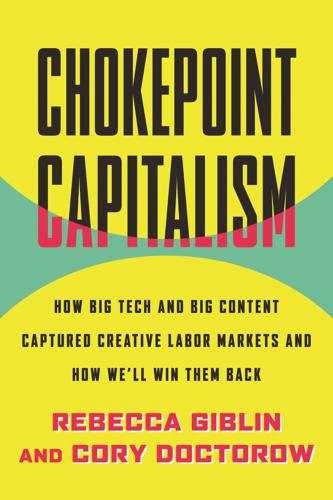
pages: 396 words: 113,613
Chokepoint Capitalism by Rebecca Giblin, Cory Doctorow
Aaron Swartz, AltaVista, barriers to entry, Berlin Wall, Bernie Sanders, Big Tech, big-box store, Black Lives Matter, book value, collective bargaining, commoditize, coronavirus, corporate personhood, corporate raider, COVID-19, disintermediation, distributed generation, Fairchild Semiconductor, fake news, Filter Bubble, financial engineering, Firefox, forensic accounting, full employment, gender pay gap, George Akerlof, George Floyd, gig economy, Golden age of television, Google bus, greed is good, green new deal, high-speed rail, Hush-A-Phone, independent contractor, index fund, information asymmetry, Jeff Bezos, John Gruber, Kickstarter, laissez-faire capitalism, low interest rates, Lyft, Mark Zuckerberg, means of production, microplastics / micro fibres, Modern Monetary Theory, moral hazard, multi-sided market, Naomi Klein, Network effects, New Journalism, passive income, peak TV, Peter Thiel, precision agriculture, regulatory arbitrage, remote working, rent-seeking, ride hailing / ride sharing, Robert Bork, Saturday Night Live, shareholder value, sharing economy, Silicon Valley, SoftBank, sovereign wealth fund, Steve Jobs, Steven Levy, stock buybacks, surveillance capitalism, Susan Wojcicki, tech bro, tech worker, The Chicago School, The Wealth of Nations by Adam Smith, TikTok, time value of money, transaction costs, trickle-down economics, Turing complete, Uber and Lyft, uber lyft, union organizing, Vanguard fund, vertical integration, WeWork

pages: 172 words: 46,104
Television Is the New Television: The Unexpected Triumph of Old Media in the Digital Age by Michael Wolff
activist fund / activist shareholder / activist investor, AOL-Time Warner, barriers to entry, Carl Icahn, commoditize, creative destruction, digital divide, disintermediation, Golden age of television, Great Leap Forward, hiring and firing, Joseph Schumpeter, Marc Andreessen, Mark Zuckerberg, Marshall McLuhan, Michael Milken, Sheryl Sandberg, Silicon Valley, SoftBank, Steve Jobs, Susan Wojcicki, telemarketer, the medium is the message, vertical integration, zero-sum game

pages: 197 words: 59,946
The Thank You Economy by Gary Vaynerchuk
Apple's 1984 Super Bowl advert, augmented reality, business process, call centre, Chuck Templeton: OpenTable:, Cornelius Vanderbilt, crowdsourcing, en.wikipedia.org, Golden age of television, hiring and firing, intangible asset, Jeff Bezos, new economy, pre–internet, Skype, social software, Tony Hsieh

pages: 294 words: 87,986
4th Rock From the Sun: The Story of Mars by Nicky Jenner
3D printing, Alfred Russel Wallace, Apollo 11, Apollo 13, Astronomia nova, cuban missile crisis, Dennis Tito, Elon Musk, fake news, game design, Golden age of television, hive mind, invention of the telescope, Johannes Kepler, Kickstarter, Kim Stanley Robinson, Late Heavy Bombardment, low earth orbit, Mars Society, Neil Armstrong, On the Revolutions of the Heavenly Spheres, overview effect, placebo effect, Pluto: dwarf planet, retrograde motion, selection bias, silicon-based life, Skype, Stephen Hawking, technoutopianism, TED Talk, Virgin Galactic

pages: 324 words: 80,217
The Decadent Society: How We Became the Victims of Our Own Success by Ross Douthat
Affordable Care Act / Obamacare, AI winter, Apollo 13, Bernie Sanders, bitcoin, Black Lives Matter, Boeing 747, Burning Man, Capital in the Twenty-First Century by Thomas Piketty, carbon tax, centre right, Charlie Hebdo massacre, charter city, crack epidemic, CRISPR, crowdsourcing, David Graeber, Deng Xiaoping, deplatforming, Donald Trump, driverless car, East Village, Easter island, Elon Musk, fake news, Flynn Effect, Francis Fukuyama: the end of history, Francisco Pizarro, ghettoisation, gig economy, Golden age of television, green new deal, Haight Ashbury, helicopter parent, hive mind, Hyperloop, immigration reform, informal economy, intentional community, Intergovernmental Panel on Climate Change (IPCC), Islamic Golden Age, Jeff Bezos, Jeremy Corbyn, Joan Didion, Kevin Kelly, Kickstarter, knowledge worker, life extension, low interest rates, mass immigration, mass incarceration, means of production, megacity, meritocracy, microaggression, move fast and break things, multiplanetary species, Neal Stephenson, Neil Armstrong, New Journalism, Nicholas Carr, Norman Mailer, obamacare, Oculus Rift, open borders, opioid epidemic / opioid crisis, out of africa, Panopticon Jeremy Bentham, Paris climate accords, peak TV, Peter Thiel, plutocrats, pre–internet, private spaceflight, QAnon, quantitative easing, radical life extension, rent-seeking, Robert Bork, Robert Gordon, Ronald Reagan, secular stagnation, self-driving car, Silicon Valley, Silicon Valley billionaire, Silicon Valley ideology, Snapchat, Snow Crash, Social Justice Warrior, social web, Steve Bannon, Steve Jobs, Steven Pinker, technoutopianism, TED Talk, the built environment, The Rise and Fall of American Growth, Tyler Cowen, Tyler Cowen: Great Stagnation, wage slave, WeWork, women in the workforce, Y2K
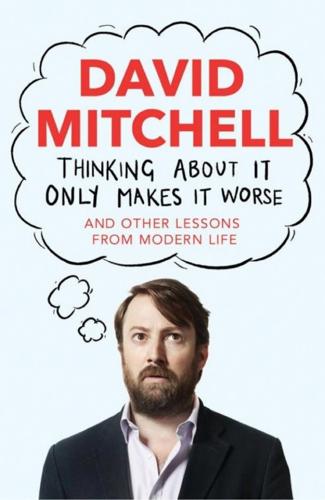
pages: 354 words: 99,690
Thinking About It Only Makes It Worse: And Other Lessons From Modern Life by David Mitchell
bank run, Boris Johnson, British Empire, cakes and ale, cognitive dissonance, collapse of Lehman Brothers, credit crunch, don't be evil, double helix, Downton Abbey, Dr. Strangelove, Etonian, eurozone crisis, Golden age of television, haute cuisine, high-speed rail, Julian Assange, lateral thinking, Northern Rock, Ocado, offshore financial centre, payday loans, plutocrats, profit motive, Russell Brand, sensible shoes, Skype, The Wisdom of Crowds, WikiLeaks
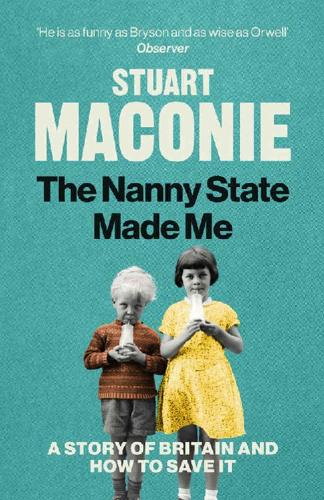
pages: 300 words: 106,520
The Nanny State Made Me: A Story of Britain and How to Save It by Stuart Maconie
"there is no alternative" (TINA), banking crisis, basic income, Bernie Sanders, Big Tech, bitcoin, Black Lives Matter, Boris Johnson, British Empire, Bullingdon Club, cognitive dissonance, collective bargaining, Corn Laws, David Attenborough, Desert Island Discs, don't be evil, Downton Abbey, driverless car, Elon Musk, Etonian, Extinction Rebellion, failed state, fake news, Francis Fukuyama: the end of history, full employment, G4S, gentrification, Golden age of television, Gordon Gekko, greed is good, Greta Thunberg, helicopter parent, hiring and firing, housing crisis, Jeremy Corbyn, job automation, Mark Zuckerberg, market fundamentalism, Marshall McLuhan, North Sea oil, Own Your Own Home, plutocrats, post-truth, post-war consensus, rent control, retail therapy, Right to Buy, road to serfdom, Russell Brand, Silicon Valley, Stephen Fry, surveillance capitalism, The Chicago School, universal basic income, Winter of Discontent

pages: 335 words: 114,039
David Mitchell: Back Story by David Mitchell
British Empire, Bullingdon Club, call centre, correlation does not imply causation, credit crunch, Desert Island Discs, Downton Abbey, energy security, gentrification, Golden age of television, Kickstarter, lateral thinking, Russell Brand, Stephen Fry

pages: 414 words: 117,581
Binge Times: Inside Hollywood's Furious Billion-Dollar Battle to Take Down Netflix by Dade Hayes, Dawn Chmielewski
activist fund / activist shareholder / activist investor, Airbnb, Albert Einstein, Amazon Web Services, AOL-Time Warner, Apollo 13, augmented reality, barriers to entry, Big Tech, borderless world, cloud computing, cognitive dissonance, content marketing, coronavirus, corporate raider, COVID-19, data science, digital rights, Donald Trump, Downton Abbey, Elon Musk, George Floyd, global pandemic, Golden age of television, haute cuisine, hockey-stick growth, invention of the telephone, Jeff Bezos, John Markoff, Jony Ive, late fees, lockdown, loose coupling, Marc Andreessen, Mark Zuckerberg, Mitch Kapor, Netflix Prize, Osborne effect, performance metric, period drama, Phoebe Waller-Bridge, QR code, reality distortion field, recommendation engine, remote working, Ronald Reagan, Salesforce, Saturday Night Live, Silicon Valley, skunkworks, Skype, Snapchat, social distancing, Steve Jobs, subscription business, tech bro, the long tail, the medium is the message, TikTok, Tim Cook: Apple, vertical integration, WeWork

pages: 515 words: 143,055
The Attention Merchants: The Epic Scramble to Get Inside Our Heads by Tim Wu
1960s counterculture, Aaron Swartz, Affordable Care Act / Obamacare, AltaVista, Andrew Keen, anti-communist, AOL-Time Warner, Apple II, Apple's 1984 Super Bowl advert, barriers to entry, Bob Geldof, borderless world, Brownian motion, Burning Man, Cass Sunstein, citizen journalism, colonial rule, content marketing, cotton gin, data science, do well by doing good, East Village, future of journalism, George Gilder, Golden age of television, Golden Gate Park, Googley, Gordon Gekko, Herbert Marcuse, housing crisis, informal economy, Internet Archive, Jaron Lanier, Jeff Bezos, jimmy wales, John Perry Barlow, Live Aid, Mark Zuckerberg, Marshall McLuhan, McMansion, mirror neurons, Nate Silver, Neal Stephenson, Network effects, Nicholas Carr, Pepsi Challenge, placebo effect, Plato's cave, post scarcity, race to the bottom, road to serfdom, Saturday Night Live, science of happiness, self-driving car, side project, Silicon Valley, Skinner box, slashdot, Snapchat, Snow Crash, Steve Jobs, Steve Wozniak, Steven Levy, Ted Nelson, telemarketer, the built environment, The Chicago School, the scientific method, The Structural Transformation of the Public Sphere, Tim Cook: Apple, Torches of Freedom, Upton Sinclair, upwardly mobile, Virgin Galactic, Wayback Machine, white flight, Yochai Benkler, zero-sum game
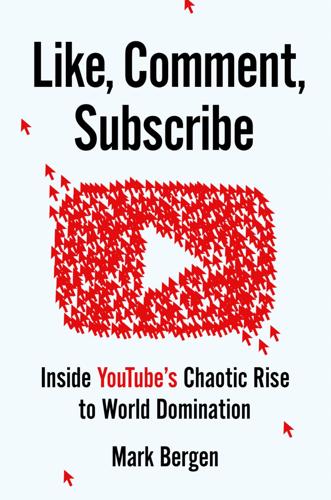
pages: 642 words: 141,888
Like, Comment, Subscribe: Inside YouTube's Chaotic Rise to World Domination by Mark Bergen
23andMe, 4chan, An Inconvenient Truth, Andy Rubin, Anne Wojcicki, Big Tech, Black Lives Matter, book scanning, Burning Man, business logic, call centre, Cambridge Analytica, citizen journalism, cloud computing, Columbine, company town, computer vision, coronavirus, COVID-19, crisis actor, crowdsourcing, cryptocurrency, data science, David Graeber, DeepMind, digital map, disinformation, don't be evil, Donald Trump, Edward Snowden, Elon Musk, fake news, false flag, game design, gender pay gap, George Floyd, gig economy, global pandemic, Golden age of television, Google Glasses, Google X / Alphabet X, Googley, growth hacking, Haight Ashbury, immigration reform, James Bridle, John Perry Barlow, Justin.tv, Kevin Roose, Khan Academy, Kinder Surprise, Marc Andreessen, Marc Benioff, Mark Zuckerberg, mass immigration, Max Levchin, Menlo Park, Minecraft, mirror neurons, moral panic, move fast and break things, non-fungible token, PalmPilot, paypal mafia, Peter Thiel, Ponzi scheme, QAnon, race to the bottom, recommendation engine, Rubik’s Cube, Salesforce, Saturday Night Live, self-driving car, Sheryl Sandberg, side hustle, side project, Silicon Valley, slashdot, Snapchat, social distancing, Social Justice Warrior, speech recognition, Stanford marshmallow experiment, Steve Bannon, Steve Jobs, Steven Levy, surveillance capitalism, Susan Wojcicki, systems thinking, tech bro, the long tail, The Wisdom of Crowds, TikTok, Walter Mischel, WikiLeaks, work culture
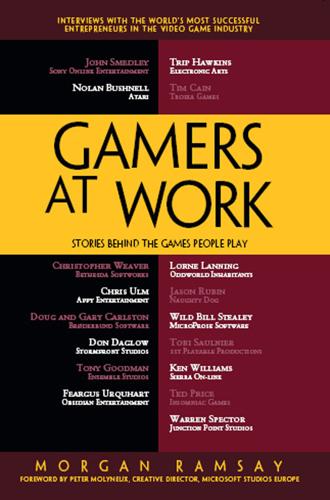
pages: 500 words: 146,240
Gamers at Work: Stories Behind the Games People Play by Morgan Ramsay, Peter Molyneux
Any sufficiently advanced technology is indistinguishable from magic, augmented reality, Bill Atkinson, Bob Noyce, book value, collective bargaining, Colossal Cave Adventure, do what you love, financial engineering, game design, Golden age of television, Ian Bogost, independent contractor, index card, Mark Zuckerberg, oil shock, pirate software, RAND corporation, risk tolerance, Silicon Valley, SimCity, Skype, Steve Jobs, Von Neumann architecture

pages: 1,104 words: 302,176
The Rise and Fall of American Growth: The U.S. Standard of Living Since the Civil War (The Princeton Economic History of the Western World) by Robert J. Gordon
3D printing, Affordable Care Act / Obamacare, airline deregulation, airport security, Apple II, barriers to entry, big-box store, blue-collar work, business cycle, Capital in the Twenty-First Century by Thomas Piketty, carbon tax, Charles Lindbergh, classic study, clean water, collective bargaining, computer age, cotton gin, creative destruction, deindustrialization, Detroit bankruptcy, discovery of penicillin, Donner party, Downton Abbey, driverless car, Edward Glaeser, en.wikipedia.org, Erik Brynjolfsson, everywhere but in the productivity statistics, feminist movement, financial innovation, food desert, Ford Model T, full employment, general purpose technology, George Akerlof, germ theory of disease, glass ceiling, Glass-Steagall Act, Golden age of television, government statistician, Great Leap Forward, high net worth, housing crisis, Ida Tarbell, immigration reform, impulse control, income inequality, income per capita, indoor plumbing, industrial robot, inflight wifi, interchangeable parts, invention of agriculture, invention of air conditioning, invention of the sewing machine, invention of the telegraph, invention of the telephone, inventory management, James Watt: steam engine, Jeff Bezos, jitney, job automation, John Markoff, John Maynard Keynes: Economic Possibilities for our Grandchildren, labor-force participation, Les Trente Glorieuses, Lewis Mumford, Loma Prieta earthquake, Louis Daguerre, Louis Pasteur, low skilled workers, manufacturing employment, Mark Zuckerberg, market fragmentation, Mason jar, mass immigration, mass incarceration, McMansion, Menlo Park, minimum wage unemployment, mortgage debt, mortgage tax deduction, new economy, Norbert Wiener, obamacare, occupational segregation, oil shale / tar sands, oil shock, payday loans, Peter Thiel, Phillips curve, pink-collar, pneumatic tube, Productivity paradox, Ralph Nader, Ralph Waldo Emerson, refrigerator car, rent control, restrictive zoning, revenue passenger mile, Robert Solow, Robert X Cringely, Ronald Coase, school choice, Second Machine Age, secular stagnation, Skype, Southern State Parkway, stem cell, Steve Jobs, Steve Wozniak, Steven Pinker, streetcar suburb, The Market for Lemons, The Rise and Fall of American Growth, Thomas Malthus, total factor productivity, transaction costs, transcontinental railway, traveling salesman, Triangle Shirtwaist Factory, undersea cable, Unsafe at Any Speed, Upton Sinclair, upwardly mobile, urban decay, urban planning, urban sprawl, vertical integration, warehouse robotics, washing machines reduced drudgery, Washington Consensus, Watson beat the top human players on Jeopardy!, We wanted flying cars, instead we got 140 characters, working poor, working-age population, Works Progress Administration, yellow journalism, yield management